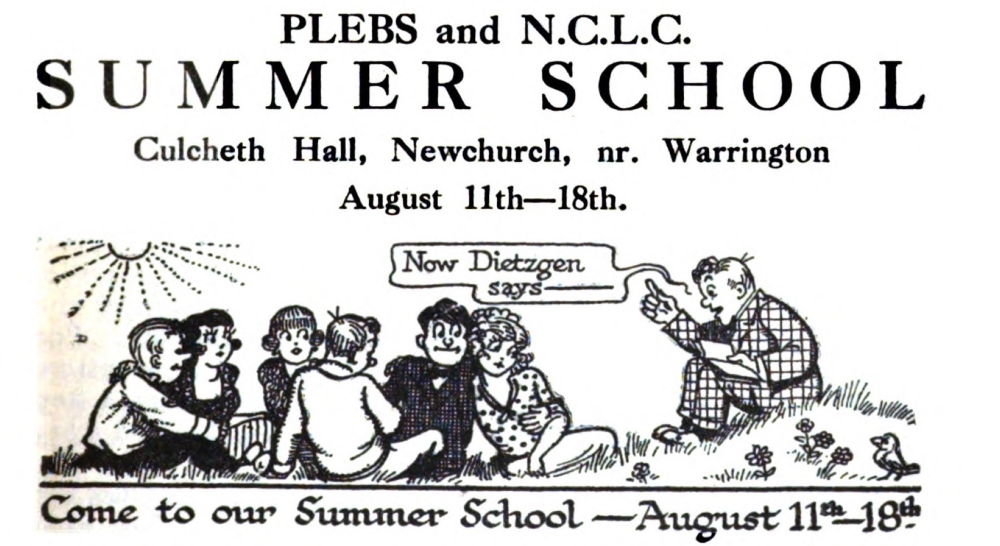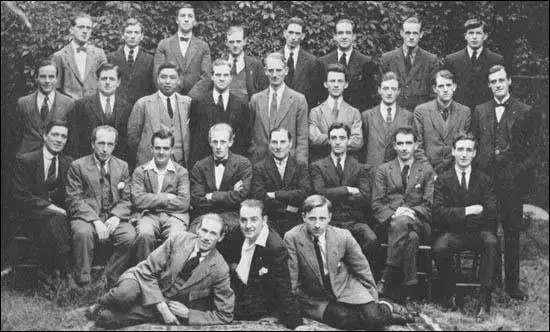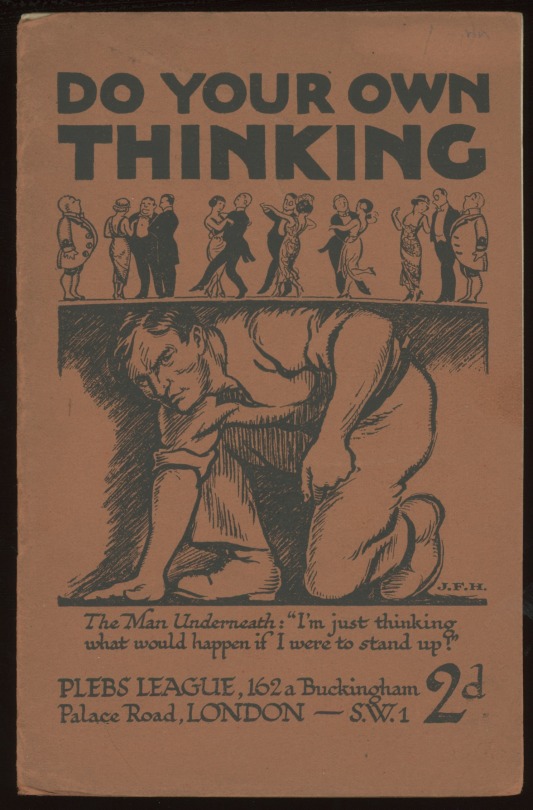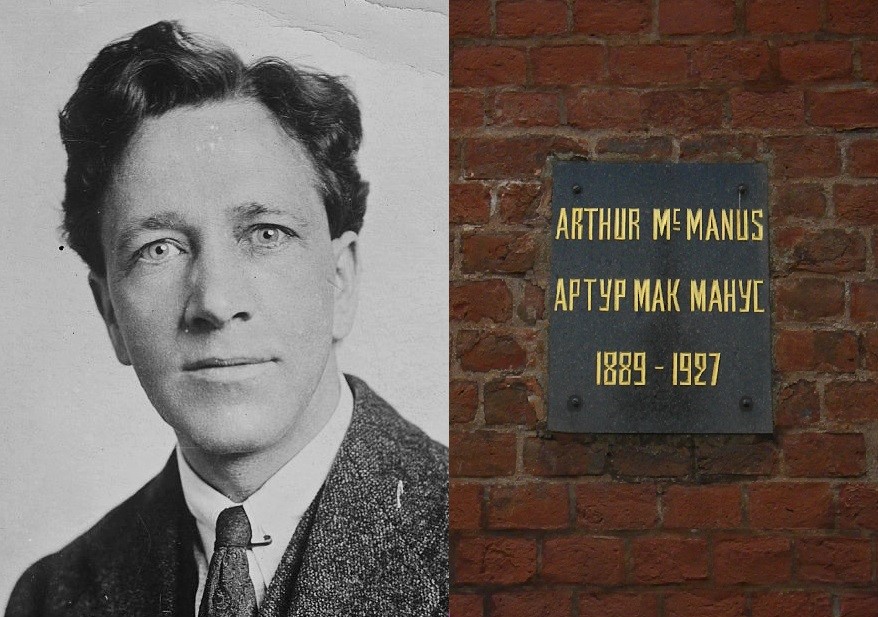Belfast-born Arthur MacManus was Introduced to a life of revolutionary activism and interest in workers’ education at Marxian Educational Classes given by the Socialist Labour Party in Glasgow during the early 1900s. A leading figure in the first years of British and International Communism, MacManus served on the Political Bureau of the C.P.G.B. and member of the E.C. of the Communist International. In this articles MacManus gives us a brief but helpful history of workers’ education in Britain, covering the Ruskin College, the Workers Educational Association (WEA), the Central Labour College, the Plebs League, along with a statement of the new Communist Party’s relationships with existing educational forces, and its own perspectives and tasks in the development of workers’ education. MacManus died in 1927, his ashes were interred in the Kremlin Wall.
‘Working-Class Education in Great Britain’ by Arthur MacManus from Communist International. Vol. 1 No. 25. Spring, 1923.
The origin of working-class education as a definite process in Great Britain dates back to the year 1899, when RUSKIN COLLEGE was founded, and named after John Ruskin.
Previous to this, the bourgeois educational authorities, conscious of the significance of the rapidly growing Trade Union and Labour Movement, had instituted a series of special extension and continuation classes, with facilities suited to the workers. The more Radical University heads had also initiated the formation of an organisation specially devoted to the education of workers, called the WORKERS’ EDUCATIONAL ASSOCIATION. The character of the education inculcated by these bodies was purely bourgeois, and had not the slightest relation to the growing situation in the Trade Union and Labour Movement, and consequently Labour was compelled to attend to the question of the training of workers for its own purpose.
The general position of the movement at that time was briefly this: In the year 1890 the affiliated membership to the Trades Union Congress had grown to 1,470,000, a jump in five years of almost a MILLION.
In 1892 the first Independent Labour Representatives were returned to Parliament, including Keir Hardie and John Burns.
The Labour Representation Committee had been formed to establish a political Labour Party independent of the Liberals, and a few years later the Labour Party itself was formed. The rapid progress and development of the Trade Union Movement during these years had created a very serious problem indeed, in the general lack of efficient and trained workers to fill the rapidly accumulating posts of leadership. It was out of this situation that the idea of an independent college for the education of the workers was conceived, and the college itself finally established. Some of the leading unions assisted the college by subsidies, in return for which they were entitled to a proportionate amount of scholarships. A number of the most promising workers were enabled to attend the college as resident students, while later a system of correspondence training was instituted to cater for those unable to qualify for residential tuition. The result was that in a few years the various positions in the Branches and Councils of the Unions became occupied by Ruskin-trained workers.
The essence of the training received soon made itself manifest. Instead of producing skilled and trained revolutionary leaders of the workers in their struggles, a plethora of pedantic administrators was distributed throughout the movement, skilled in the technique of Conciliation and Arbitration, and concerned more with displaying superior skill in the art of book-keeping, etc., before those workers at whose expense their knowledge had been garnered.
This crew constituted the basis of what is our modern Trade Union Bureaucracy.
ADVENT OF MARXISM.
Round about the same period Marx became more popular in Great Britain. The struggles going on within the SOCIAL DEMOCRATIC FEDERATION brought Marxism into more prominence, and the splits which occurred in that body in 1903 and 1905, leading to the formation of the SOCIALIST LABOUR PARTY and the SOCIALIST PARTY OF GREAT BRITAIN were responsible for Marxism becoming an issue in the political parties themselves. The influence of Daniel de Leon began to be felt, and his pamphlets began to be circulated widely. Naturally the Ruskin College students did not escape from the effects of this literature and soon a struggle began inside the college to have the teaching of Marx inserted in the curriculum. The college authorities opposed this vigorously, and a split took place in 1909, when the dissentient Marxians founded the Central Labour College. The struggle was now transferred to the unions, where efforts were made to transfer the subsidies to the new college.
CENTRAL LABOUR COLLEGE.
The students, who with DENNIS HIRD the leading tutor, had now definitely left Ruskin, managed to secure the assistance of subsidies from the National Union of Railwaymen and the South Wales Miners’ Federation, and definite scholarships were established. The College, now removed from Oxford to London, had found a basis for existence, and with the aid of a little magazine called the “Plebs” it commenced its work. Its period of existence has been rather a precarious one. At all times its income has been barely sufficient to make ends meet; yet it managed to struggle on until the outbreak of war in 1914, when it was compelled to close down for a period.
The Editorship of its magazine passed into the hands of an able writer, J.F. Horrabin, whose breezy commentaries, interesting reviews (particularly when the W.E.A. was on the carpet) and general defence of the College, attracted a loyal body of readers who kept the magazine going during the dark days of the war.
The magazine maintained the existence of the college, nominally at least, when otherwise it might have been closed altogether by the Trade Union Officials who had little love for it and its work. When, after the Armistice, it was reopened and taken over finally by the Executives of the Unions concerned (chiefly the N.U.R. and South Wales Miners) its name changed to the LABOUR COLLEGE. It was controlled by Governors elected from the E.C.’s and from the staff of teachers.
The Plebs League became the propagandist of the extension of such Labour Colleges and with the magazine as its central organ, it has been responsible for the stimulating into existence of innumerable provincial classes and as a League has practically all the various classes and Marxian circles associated to it.
The name was recently changed to that of the National Council of Labour Colleges.
The result of this work of the Plebs and the College is revealed in the number of former students who occupy prominent positions in the Unions. Particularly in the South Wales coalfield, the majority of the Officials are either former resident students or have passed through the Plebs classes in the districts.
As an indication of the general type produced by the various colleges and classes, the following are worth mention:-
Frank Hodges, Sec. of the Miners’ Federation-Ruskin College. Robert Young, Gen. Sec. of Amalgamated Engineers until elected to Parliament in 1918-Ruskin College.
C.P. Cramp, Gen. Industrial Sec. of the Nat. Union of Railwaymen Product of the classes of the Central Labour College.
J. Marchbank, President of the Nat. Union of Railwaymen, Product of the Scottish Labour College classes under John MacLean.
Noah Ablett. Executive member and leading Official of the Miners’ Federation of Great Britain–One of the founders of Central Labour College in split from Ruskin.
A.J. Cook, E.C. Member and leading Official of Miners’ Federation-Central Labour College.
Curiously enough, both Hodges and Ablett were students in Ruskin College at the period just prior to the split, and while I am not sure whether Hodges was actually there during the split, I feel certain, from what I can remember, that he did not join the Central Labour College.
These are three of the strongest single Unions in the country and the haul of Three Secretaryships and one Presidentship is by no means a small one. It should also be remembered that besides these a big number of the district and local official positions in the Miners’ Union are held by former students, particularly of C.L.C., and that in the engineers Ruskin has a fair representation in this direction.
It would be extremely interesting to know exactly how many former Ruskin students found their resting place in the innumerable Government positions rendered available by the establishment of Labour Exchanges, Industrial Conciliation Boards, Ministry of Labour, etc., etc.; certain it is that a good number, disappointed at having been anticipated and outdistanced by the volume of candidates for positions in the growing Labour Party, vomited forth from the Universities, found consolation in the quiet and secure haunts of the various Government departments.
PLEBS AND THE C.P.
The formation of the Communist Party and its later adoption of the Theses on organisation and education quite naturally brought a clash between the Party and the Plebs.
Party members, on a considerable number of whom the Plebs relied for the carrying on of their class work, were now instructed to turn their attention to the question of the Party training, and the training of education department at once set about organising groups for this work. Further, the tightening up of the relationship of the Party membership to the decisions and discipline of the Party involved some members who were active in the work of the Plebs.
At one time it looked as if a somewhat serious struggle was imminent, but as a result of a conference between the two, the following has been arrived at:-
“COMMUNIST PARTY AND WORKING-CLASS EDUCATION.”
1. The Communist Party puts in the forefront the importance of working-class education in the revolutionary struggle.
2. For this purpose the Communist Party makes every effort to promote working-class education, both by developing classes itself and encouraging every development of independent working-class education under working-class control. The Communist Party recognises the importance of helping forward such efforts as against all forms of subsidised and bourgeois education for the workers, and, in particular, in the struggle between the existing I.W.C.E. movement and the Workers’ Educational Association, throws its influence on the side of the I.W.C.E. movement.
3. At the same time, the Communist Party proclaims that there can be no true independent education of the working-class which is neutral in the actual struggle of the workers, and therefore insists that the working-class education can only achieve its object under the leadership of the Party. The Communist Party accordingly openly declares that, while playing its part in and assisting the work of non-party working-class educational organisations, it consistently works for and instructs its members to work for the Communist education of the workers under the guidance and inspiration of the Party, and to fight in these bodies against any tendencies in opposition to the Communist aim.
This statement governs the principles at issue. To meet the practical difficulties arising, the Executive Committee has met the Plebs League Executive, and a working arrangement has been drawn up on the following lines:
AGREED STATEMENT BETWEEN THE NATIONAL PARTY TRAINING DEPARTMENT AND THE EXECUTIVE OF THE PLEBS LEAGUE.
1. Objects of the Plebs League.
The Plebs League has for its object the training of workers into class-conscious revolutionaries with the definite aim of the abolition of wage-slavery. The Communist Party takes note of this their declaration.
2. Object of the Party Education Department.
The object of the Party Training department is (1) the training of Party candidates and members in the principles and policy of the party and the methods of its work and organisation. (This can only be done by the Party itself.) (2) To promote the spread among the workers of such education as will create and intensify revolutionary class consciousness.
3. These activities are complementary and not antagonistic.
4. Whilst reserving at all times the right to criticise the Plebs League and the N.C.L.C., the Communist Party recognises the usefulness of the class work of these bodies and will generally assist it.
The clause which vitally strikes at the centre is clause 3. It is here that principle is involved, as this clause constitutes a challenge to the old former interpretation of Marxism. The reference here to remaining “neutral” would at first sight appear to be covered by clause 1 of the Objects of the Plebs League.
This declaration makes the League definitely proletarian and revolutionary aiming at the abolition of wage slavery. But what the Party has in mind is not only that neutrality is impossible between the working-class and Capitalism, but that such neutrality is also impossible within the Labour Movement itself.
The contention of the Party is that the success of the revolution is dependent upon the single political leadership of the masses. This leadership is and can only be the Communist Party. It is, therefore, absolutely essential that in the struggle towards the revolution, the ideas, policy, authority, discipline, and leadership of the Party should be ever more and more strengthened and developed.
The claim that it is impossible to remain neutral means that any education claiming to be revolutionary must train the workers for active participation in the class struggle. To make this training effective these workers must also be taught how Marx understood the realities of the class struggle. The mass character of the ultimate struggle and dire necessity for the establishment of the Proletarian Dictatorship render imperative the building of a Party solidly cemented together and capable of imposing its decisions with iron discipline. Such a Party cannot be built in a day, nor can it be constructed in a year simply from any grandiose mechanical scheme cleverly drawn on paper. It can be built only from the actual struggle itself, and involves a relentless process of the blending of temperaments; the shaping and hammering out by the vicious intensity of the succeeding struggles of what Comrade Bucharin calls a “choice of leaders ensuring a combination of competence, cohesion, and absolute unity of will”; the training of every Party member in the programme of the Party; the harnessing of their activities in every direction to extend the ideas and influence of the Party; the capacity and willingness of its members, individually and collectively, to continually assume the leadership of the masses in each and every succeeding phase of the class struggle; the conducting of these struggles in such a way as will reveal to the masses the true character of capitalism and its total inability to offer any real or lasting solution to the accumulating problems of proletarian life; the involving of ever more and more of the masses in the struggle and the gradual development of the faith of the workers in the leadership of the Party as the sole director of the revolution. Thus and thus alone can a real Party of the Revolution be built, and those comrades who are active in the work of the Plebs League, if they understand this, will also understand how correct the Party is when it says that working-class education can only achieve its object under the leadership of the Party.
The great and real difficulty lies in the youth and immaturity of the Party. If such a Party as described could be fashioned in some laboratory and handed out complete and ready made, it would inspire the confidence of all sincere revolutionaries, and thus 99 per cent. of the difficulties and obstacles encountered would be dissipated. Unfortunately, this is not possible and we must, therefore, get to the task of building it. At least this is in the favour of the Party, that whatever revolutionaries there are in Great Britain, who have been tossed and battered by the struggles of the past, these are at least in the Party, and it was this very tossing, comparatively moderate though it be, with the sufferings and persecution endured in other lands, which made possible the coming together of so many hitherto antagonistic elements, and led to the formation of the Party.
The declaration of the Party on education and the basis of its working with the Plebs League is absolutely correct, just as its willingness to appreciate the fact that such organisations are capable of much that is good in the building of influence of the Party, is commendable. Proletarian education based upon training of revolutionaries out for the annihilation of the bourgeoisie must mean the training of minds conscious of the imperativeness of this singleness in the political leadership of the revolution. Such leadership must be built up, and it is part of their training to help its building. What Party is capable of this leadership? It is part of their revolutionary training to ever point out that the Labour Party, with its Social Democratic programme and its Pacifist policy, is incapable of leading the masses into revolutionary struggle or of wielding the Proletarian Dictatorship; that these organisations will become the final obstacles of the revolution and will resist the march of the workers to triumph.
The only Party which will not only be capable of it, but which has this as its supreme task, is the Communist Party.
Is neutrality, therefore, possible even within the movement itself? Those Communists and sympathisers who, in the past, have devoted so much time, energy and attention to this work of securing independent working-class education, will realise that if such efforts must not prove in vain, then the object of this education can only be realised under the control of the Party.
The ECCI published the magazine ‘Communist International’ edited first edited by Zinoviev and Karl Radek from 1919 until 1926 irregularly in German, French, Russian, and English. Restarting in 1927 and running until until 1934, when it would split into ‘U.K.’ and U.S. editions, running until 1940 when it was replaced by International Review and World Survey which was discontinued when the the Comintern disbanded in 1943. Unlike, Inprecor, CI contained long-form articles by the leading figures of the International as well as proceedings, statements, and notices of the Comintern. No complete run of Communist International is available in English. Both were largely published outside of Soviet territory, with Communist International printed in London, to facilitate distribution and both were major contributors to the Communist press in the U.S. Communist International and Inprecorr are an invaluable English-language source on the history of the Communist International and its sections.
PDF of full issue: https://www.marxists.org/history/international/comintern/ci/old_series/v01-n25-1923-CI-grn-riaz.pdf






